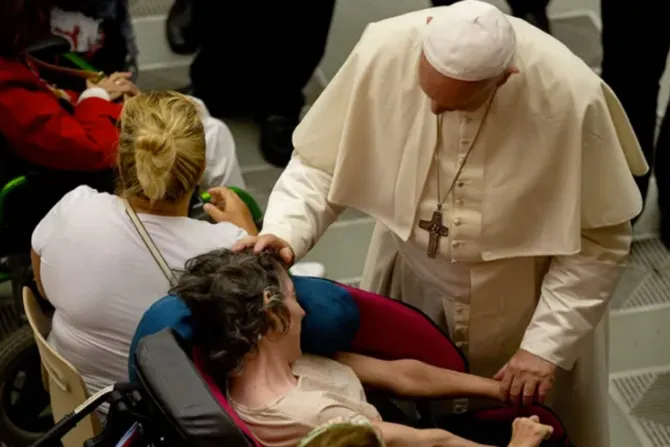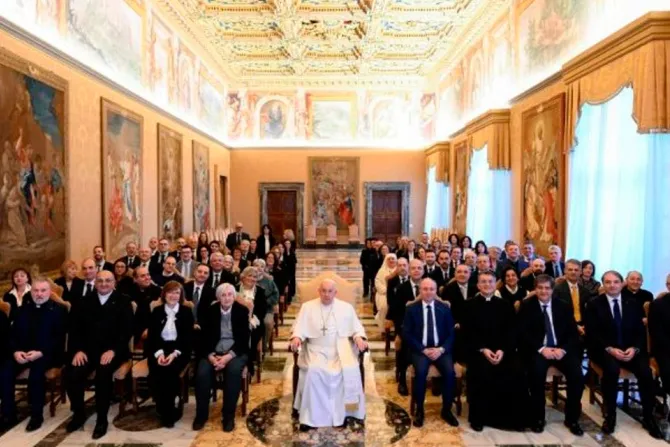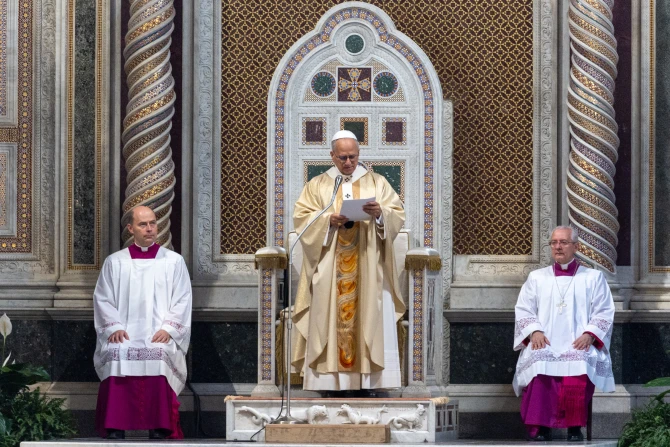Today, the Vatican Press Office released Pope Francis’s message for the 2024 World Day of the Sick, which will be celebrated on February 11th this year, under the biblical quote from Genesis: “It is not good for man to be alone.”
The World Day of the Sick was established in 1992 by Saint John Paul II, who decreed that it be celebrated each February 11th, on the liturgical memorial of Our Lady of Lourdes.
Here is the complete text of Pope Francis’s message:
“It is not good that man should be alone.”
Healing the Sick by Healing Relationships
“It is not good that man should be alone” (cf. Gen 2:18). From the beginning, God, who is love, created us for communion and endowed us with an innate capacity to enter into a relationship with others. Our lives, reflecting the image of the Trinity, are meant to attain fulfillment through a network of relationships, friendships, and love, both given and received. We were created to be together, not alone. Precisely because this project of communion is so deeply rooted in the human heart, we see the experience of abandonment and solitude as something frightening, painful, and even inhuman. This is all the more the case at times of vulnerability, uncertainty, and insecurity, often caused by the onset of a serious illness.
In this regard, I think of all those who found themselves terribly alone during the Covid-19 pandemic: the patients who could not receive visitors, but also the many nurses, physicians, and support personnel overwhelmed by work and enclosed in isolation wards. Naturally, we cannot fail to recall all those persons who had to face the hour of their death alone, assisted by healthcare personnel, but far from their own families.
I also share in the pain, suffering, and isolation felt by those who, because of war and its tragic consequences, are left without support and assistance. War is the most terrible of social diseases, and it takes its greatest toll on those who are most vulnerable.
At the same time, it needs to be said that even in countries that enjoy peace and greater resources, old age and sickness are frequently experienced in solitude and, at times, even in abandonment. This grim reality is mainly a consequence of the culture of individualism that exalts productivity at all costs, cultivates the myth of efficiency, and proves indifferent, even callous, when individuals no longer have the strength needed to keep pace. It then becomes a throwaway culture, in which “persons are no longer seen as a paramount value to be cared for and respected, especially when they are poor or disabled, ‘not yet useful’ – like the unborn, or ‘no longer needed’ – like the elderly” (Fratelli Tutti, 18). Sadly, this way of thinking also guides certain political decisions that are not focused on the dignity of the human person and his or her needs and do not always promote the strategies and resources needed to ensure that every human being enjoys the fundamental right to health and access to healthcare. The abandonment of the vulnerable and their isolation is favored also by the reduction of healthcare merely to a provision of services, without these being accompanied by a “therapeutic covenant” between physicians, patients, and family members.
We do well to listen once more to the words of the Bible: “It is not good for man to be alone!” God spoke those words at the beginning of creation and thus revealed to us the profound meaning of his project for humanity, but at the same time, the mortal wound of sin, which creeps in by generating suspicions, fractures, divisions, and consequently isolation. Sin attacks persons and all their relationships: with God, with themselves, with others, with creation. Such isolation causes us to miss the meaning of our lives; it takes away the joy of love and makes us experience an oppressive sense of being alone at all the crucial passages of life.
Brothers and sisters, the first form of care needed in any illness is compassionate and loving closeness. To care for the sick thus means above all to care for their relationships, all of them: with God, with others – family members, friends, healthcare workers –, with creation, and with themselves. Can this be done? Yes, it can be done and all of us are called to ensure that it happens. Let us look to the icon of the Good Samaritan (cf. Lk 10:25-37), to his ability to slow down and draw near to another person, to the tender love with which he cares for the wounds of a suffering brother.
Let us remember this central truth in life: we came into the world because someone welcomed us; we were made for love; and we are called to communion and fraternity. This aspect of our lives is what sustains us, above all at times of illness and vulnerability. It is also the first therapy that we must all adopt in order to heal the diseases of the society in which we live.
To those of you who experience illness, whether temporary or chronic, I would say this: Do not be ashamed of your longing for closeness and tenderness! Do not conceal it, and never think that you are a burden on others. The condition of the sick urges all of us to step back from the hectic pace of our lives in order to rediscover ourselves.
At this time of epochal change, we Christians in particular are called to adopt the compassion-filled gaze of Jesus
. Let us care for those who suffer and are alone, perhaps marginalized and cast aside. With the love for one another that Christ the Lord bestows on us in prayer, especially in the Eucharist, let us tend the wounds of solitude and isolation. In this way, we will cooperate in combating the culture of individualism, indifference, and waste, and enable the growth of a culture of tenderness and compassion.
The sick, the vulnerable, and the poor are at the heart of the Church; they must also be at the heart of our human concern and pastoral attention. May we never forget this! And let us commend ourselves to Mary Most Holy, Health of the Sick, that she may intercede for us and help us to be artisans of closeness and fraternal relationships.
Rome, Saint John Lateran, 10 January 2024
FRANCIS







